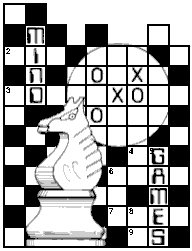| mind games |

Philip Joy looks at a new cassette which is the perfect way to end a long, tiring day
FIRST this month a review of a new game, Diceroll, from John Williamson. The idea is to total 31 by turning dice in a special manner. It was very easy to load, which is something about which most people will be pleased.
From the screen display it was difficult to see exactly what was happening at first. Compared to the Close the Box game, which has been reviewed, it is not up to his standard. With Nim, Close the Box, and this, it should please most people who like relaxing games. The cassette is available from John Williamson, West Lothian. He says that his family found the game interesting.
| |||||||||||||||||||||||||||||||||||||||||||||||||||||||||||||||||||||||||||||||||||||||||||||||||
On the left are two games played against the Artic Computing ZXchessII. The ZX-81 plays black in both games and the sender plays white.
For anyone interested in writing their own chess games, a good book to buy is Sargon, a computer chess program, by Dan and Kathie Spracklen. It includes a complete assembly program in Z-80 machine code for a chess program. Some of the routines included will need changing for the ZX-81 or Spectrum but the main program will go on unchanged. Many of the commercial programs for chess start from this basic program and expand on it.
| 'Random mazes are games of luck. Real adventures need large amounts of thinking power' |
I would like to include some comments about adventure games from Mike Farley. He says that any game advertised as a new set of dungeons each time the game is played cannot be a real adventure. Games such as Catacombs, Perilous Swamp and Oracles' Cave were in this category. This view could be taken either way but I feel that a real adventure should have the same story each time it is tried.
Games where things change are more like random mazes and random mazes need no real thinking but are luck games. Real adventures need large amounts of thinking power, so the random maze games should not be called adventures.
Farley comments that the best adventure games he has bought are Artic Adventures. He says that he solved A and B in a few hours but C needed much longer. So if you are looking for a real adventure, C is the best one.
Next month I hope to review a flight simulator written in Basic and some more programs. If you are a software producer and produce mind games, please send them to the address below. If you want them returned please send a SAE with your details. Also if you have bought any mind games, send your comments on them. I can then let other readers know which games are the most popular and any comments about any of them.
Here is a puzzle, with no prize, but the answer will be published next month. I hope to include one puzzle a month, which will need the computer and your thinking power to solve. If you have puzzles you have devised, send them. Remember, though, it should require the use of a computer, and some thinking so that it is a mind puzzle.
The puzzle is to find the sum of all the prime numbers below 5,000; taking the first one as being 1, and add to it all the prime numbers below 5,000. I will include the first program sent on either the ZX-81 or the Spectrum to solve the problem. Send the sum with your program. The answer to the puzzle will be provided next month and the program at a later date.
The address to which to write is Philip Joy, Essex.